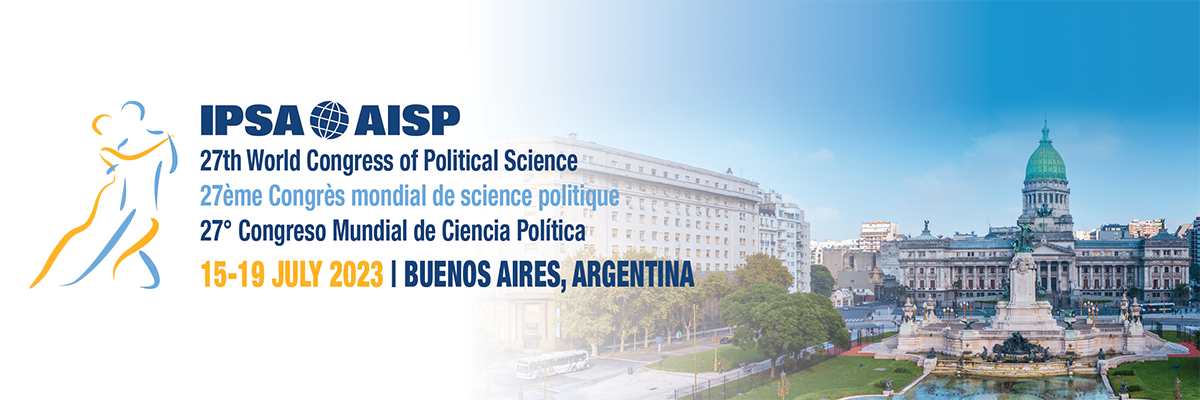

Recap of the 2023 IPSA World Congress - Day 4 (19 July)
Publication date: Sun, 09 Jul 2023
IPSA Council Elected the 27th Executive Committee
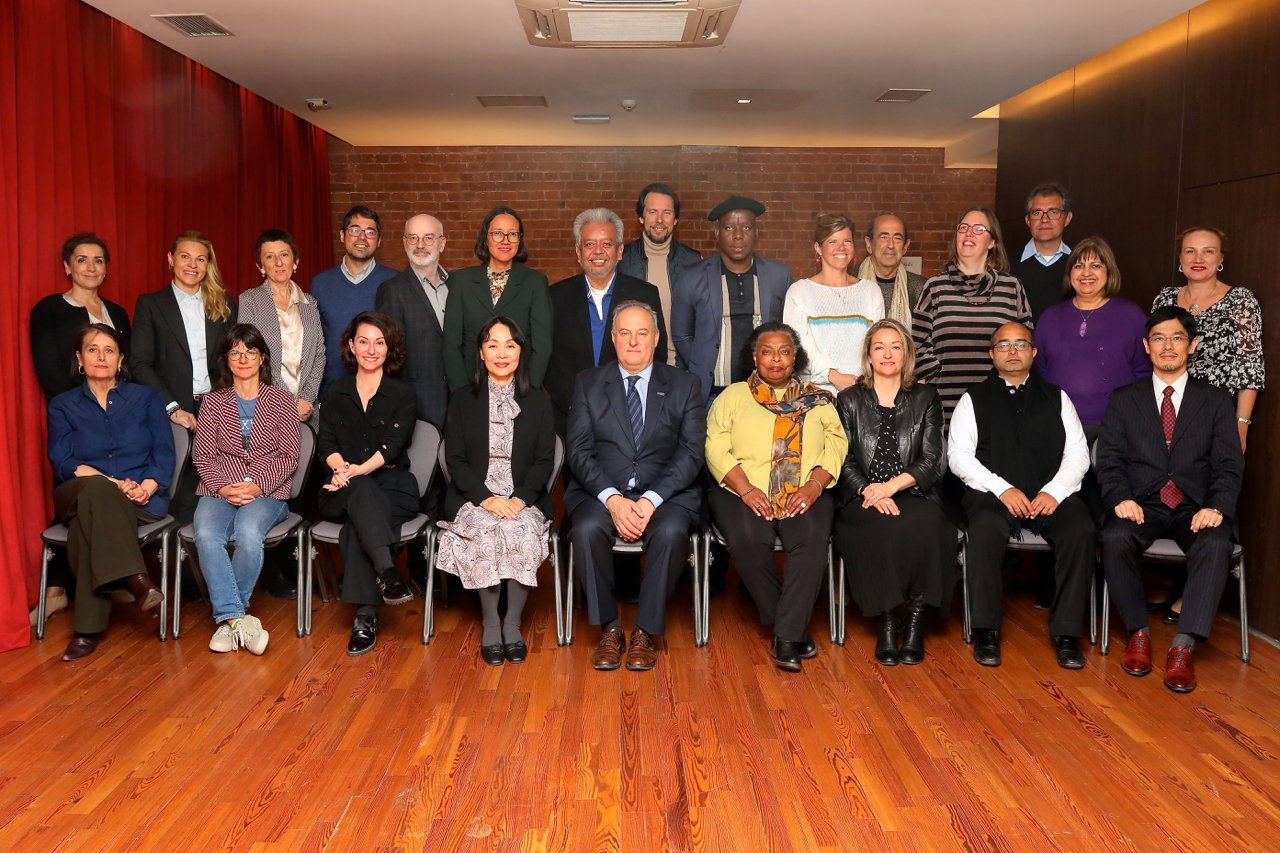 We are delighted to share the outcome of the election of the 27th Executive Committee (EC) held on 19 July 2023 at the IPSA World Congress of Political Science in Buenos Aires. We extend our warm congratulations to the 16 members who were elected by acclamation. We are also happy to announce that 56 percent of the IPSA Executive Committee elected members are women (9 out of 16). The new EC will be governing IPSA for the next two years. We are confident that their expertise, vision and dedication to the advancement of political science will foster a new era of progress and innovation within the Association.
We are delighted to share the outcome of the election of the 27th Executive Committee (EC) held on 19 July 2023 at the IPSA World Congress of Political Science in Buenos Aires. We extend our warm congratulations to the 16 members who were elected by acclamation. We are also happy to announce that 56 percent of the IPSA Executive Committee elected members are women (9 out of 16). The new EC will be governing IPSA for the next two years. We are confident that their expertise, vision and dedication to the advancement of political science will foster a new era of progress and innovation within the Association.
The Local Organizing Committee (LOC) Plenary Session:
Democracy in Latin America in the 21st Century - Lessons to the World
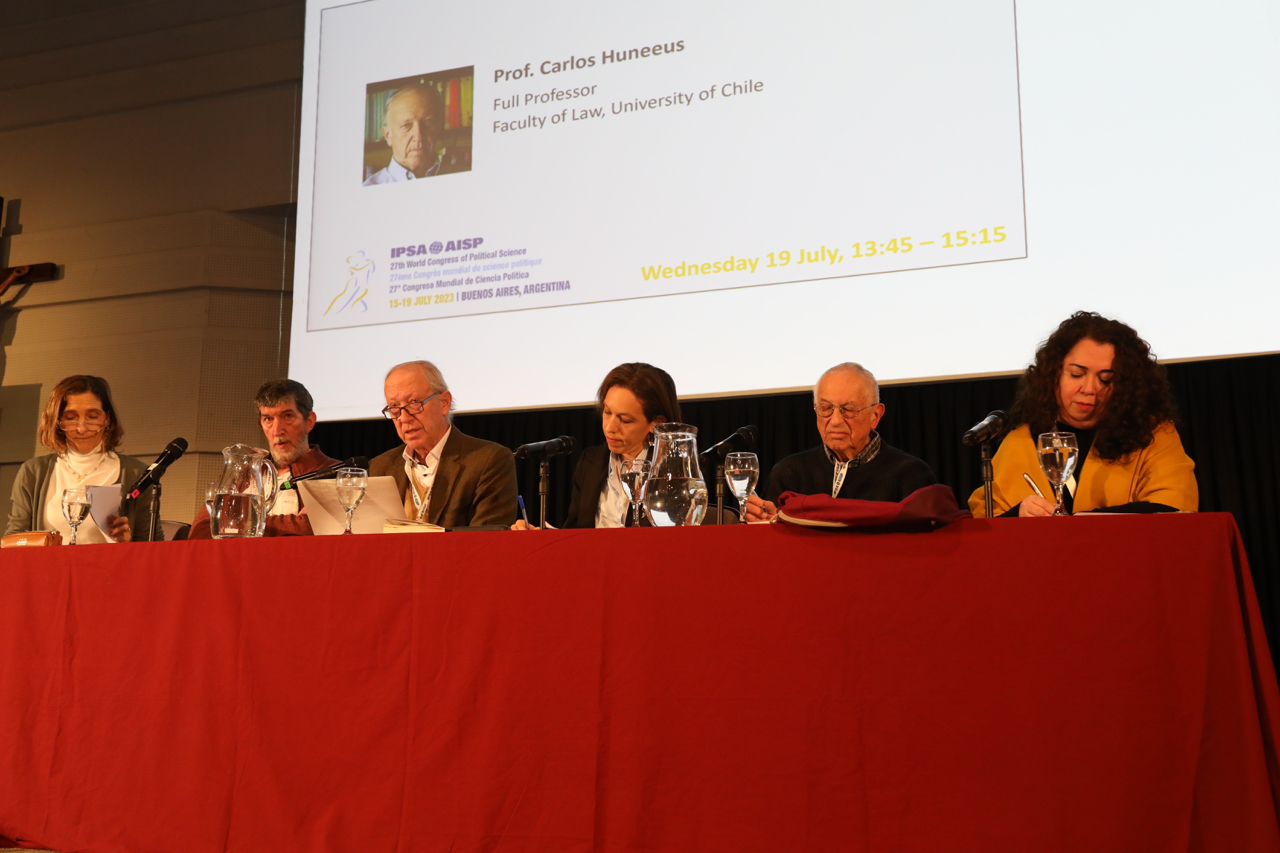 The final plenary session of the IPSA World Congress, “Democracy in Latin America in the 21st Century - Lessons for the World”, chaired by Angeles Rodríguez (Universidad Austral) and Julieta Suárez-Cao (Pontificia Universidad Católica de Chile), explored Latin America’s democratic journey from its participation in the third wave of democracy in the 80s until the present.
The final plenary session of the IPSA World Congress, “Democracy in Latin America in the 21st Century - Lessons for the World”, chaired by Angeles Rodríguez (Universidad Austral) and Julieta Suárez-Cao (Pontificia Universidad Católica de Chile), explored Latin America’s democratic journey from its participation in the third wave of democracy in the 80s until the present.
Distinguished experts in the field contributed to the discussion, including Gabriela Rodríguez Rial (University of Buenos Aires), Daniel Buquet (Instituto de Ciencia Política of the Universidad de la República, Uruguay, and ALACIP Secretary-General), Carlos Huneeus (Universidad de Chile), and Alberto Olvera (Universidad Veracruzana).
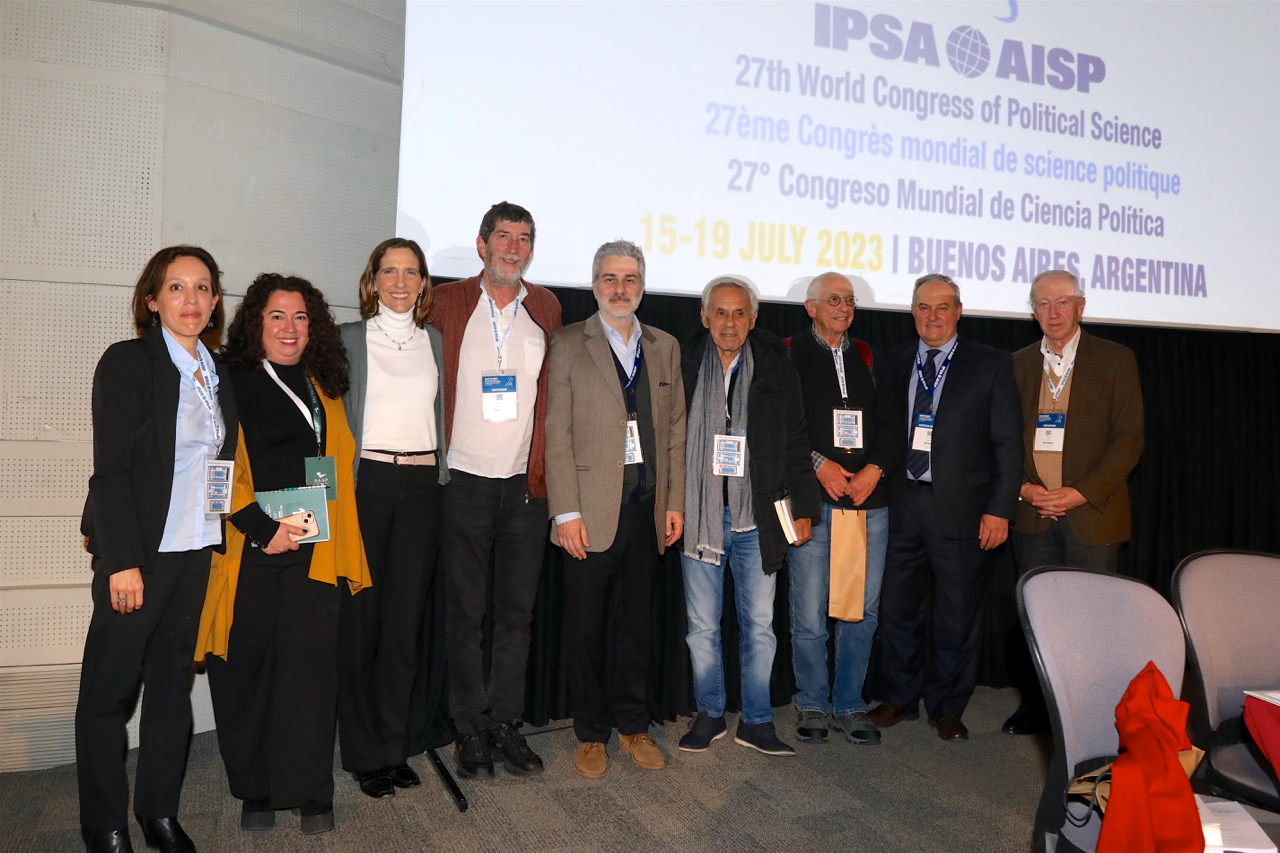 The session explored the state of democracy in Latin America, highlighted key insights regarding the region's democratic performance, and focused on the persistent challenge of inequality. This led to a discussion of how inequality and political crises have affected the stability and quality of democratic institutions in the region, using presidential elections as a case study.
The session explored the state of democracy in Latin America, highlighted key insights regarding the region's democratic performance, and focused on the persistent challenge of inequality. This led to a discussion of how inequality and political crises have affected the stability and quality of democratic institutions in the region, using presidential elections as a case study.
During the session, important ideas were brought to light, including a study on the political evolution and future prospects of Latin American politics. The discussions underscored the necessity of tackling challenges related to democracy, ideological politics, and governmental changes in the region. The case of Chile was a focal point, examining democratic transitions, political reforms, and corporate influence in the economy. Moreover, there was a strong emphasis on the importance of citizen participation and democratization in both Chile and Uruguay.
Prize of the Foundation Mattei Dogan Award Lecture
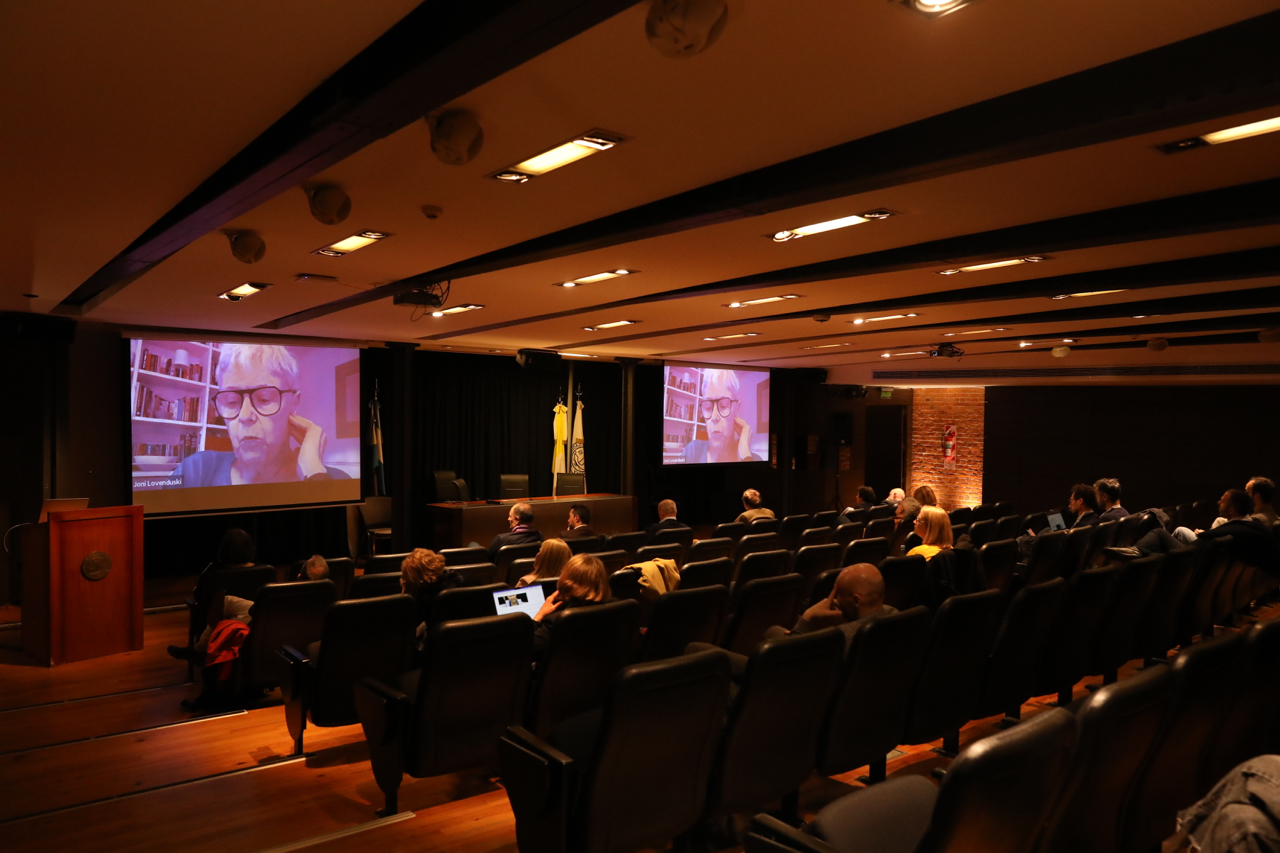
The session began with the opening speech of IPSA EC member and World Congress 2025 Program Co-chair Irasema Coronado (Arizona State University), who introduced Joni Lovenduski (Professor Emerita at Birkbeck College), the recipient of the 2023 Mattei Dogan Foundation Award.
In her virtual award lecture, Prof. Joni Lovenduski discussed the relevance of feminism in political science and the importance of achieving equality. She affirmed that feminism calls for all individuals to have the same basic rights, opportunities, and treatment regardless of gender. She stressed that feminist theory has contributed to political science by challenging traditional theories and methodologies that neglect women's perspectives. It exposes gender inequalities, power structures, and the interplay between politics and gender.
Prof. Joni Lovenduski discussed how feminist political scientists challenge male-dominated frameworks and expand political theories to include issues such as reproductive rights and gender-based violence. Despite its opponents, the ongoing exchange between feminists and other political scientists is primordial to progress and understanding politics.
About the Award
Every year, the IPSA Committee on Organization, Procedures, and Awards (COPA) selects a scholar of high international reputation in recognition of her/his contribution to the advancement of political science, with a particular focus on recognizing outstanding scholarship on comparative studies of political elites, following a nomination by IPSA Research Committee (RC02) - Political Elites. The prize is funded by the Foundation Mattei Dogan.
Closing Ceremony
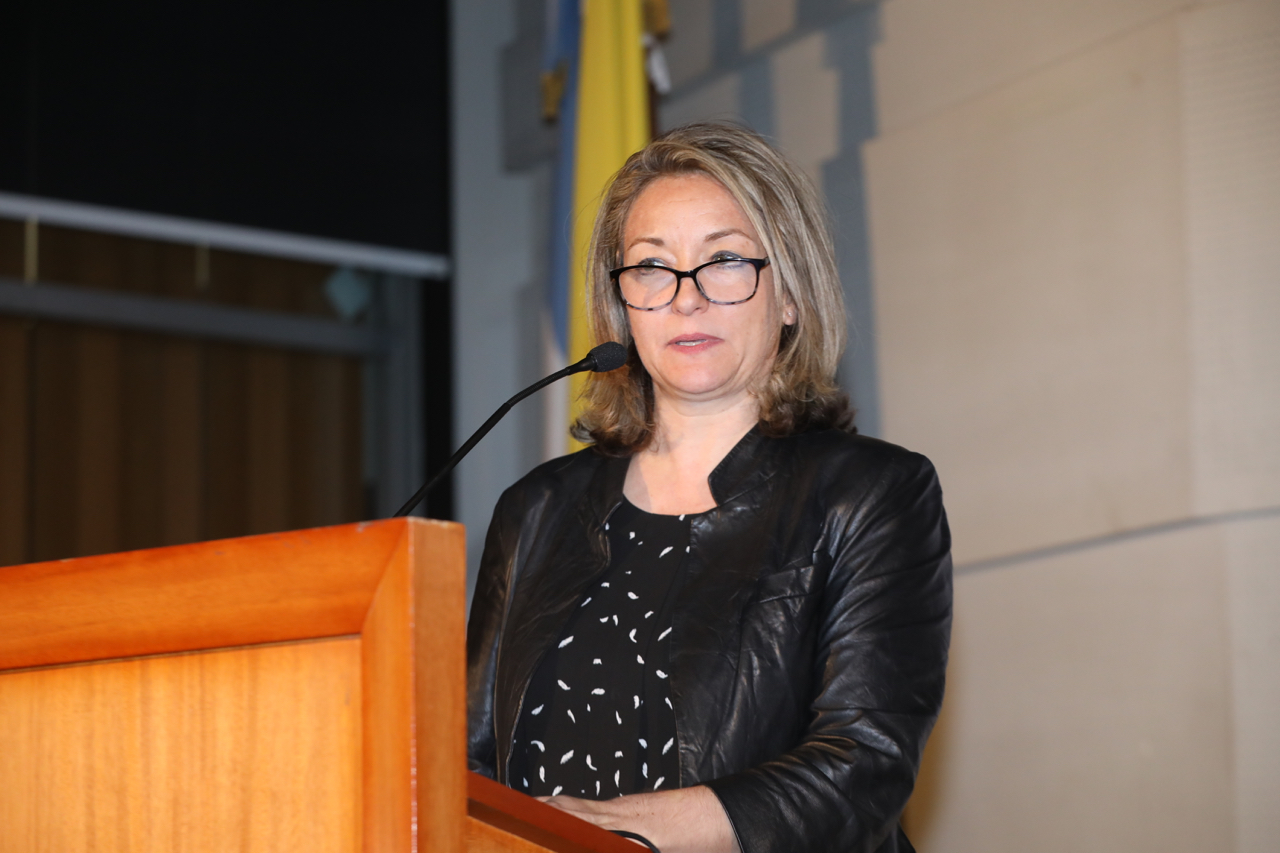
The Juan Pablo II Auditorium of the Universidad Católica Argentina hosted the Closing Ceremony of the 2023 IPSA World Congress of Political Science on 19 July. IPSA Executive Director Kim Fontaine-Skronski, who served as Master of Ceremony, thanked all participants, speakers and volunteers for their contributions to the successful event. She praised the efforts of the more than 110 on-site and virtual volunteers who were essential to the successful operation of the Congress.
The Congress was a great success, with over 3,094 registered participants from 122 countries presenting their research in over 80 sessions covering a wide range of topics. The Congress offered a rich and diverse program, with 2,829 papers, 647 panels (568 in person and 77 virtual), 4 plenary sessions, 12 special sessions, and 4 award sessions. The program covered the major sub-fields of political science, and the Research Committees organized 368 panels on their specific topics. In addition, more than 45% of the Congress participants were women.
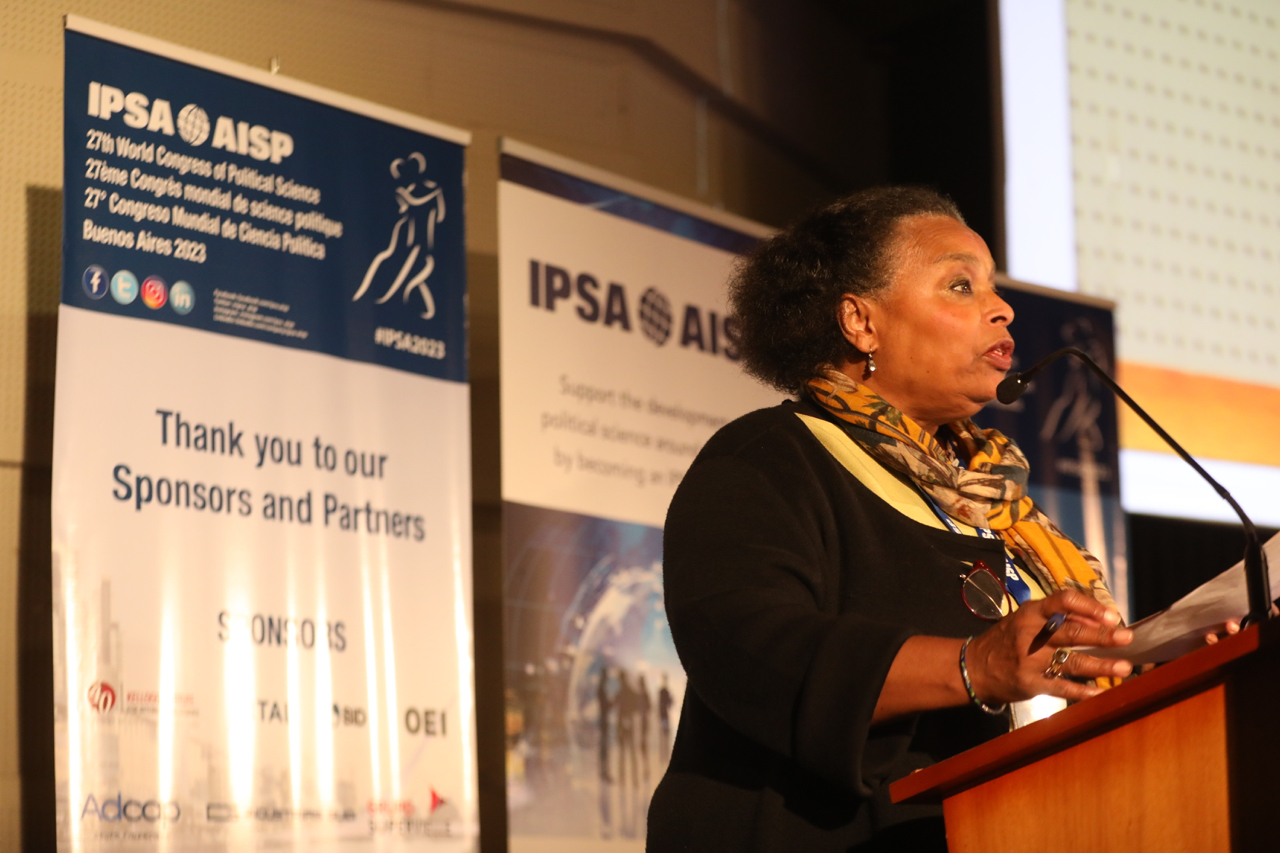 Dr. Fontaine-Skronski then invited IPSA's Past President, Dianne Pinderhughes, to the stage to introduce the new President, Pablo Oñate. In her Closing Ceremony address, Prof. Pinderhughes highlighted the vibrant intellectual exchange that took place throughout the Congress. Participants demonstrated deep engagement, expressed strong interest in the topics discussed, and were excited to be present both at the Congress and in the beautiful city of Buenos Aires. In addition, Dr. Pinderhughes highlighted the concurrent governance taking place alongside the Congress. As the panels and sessions unfolded, the IPSA Council elected Yuko Kasuya as the new President-Elect and Pablo Oñate officially assumed the position of IPSA's new President after serving for two years as President-Elect.
Dr. Fontaine-Skronski then invited IPSA's Past President, Dianne Pinderhughes, to the stage to introduce the new President, Pablo Oñate. In her Closing Ceremony address, Prof. Pinderhughes highlighted the vibrant intellectual exchange that took place throughout the Congress. Participants demonstrated deep engagement, expressed strong interest in the topics discussed, and were excited to be present both at the Congress and in the beautiful city of Buenos Aires. In addition, Dr. Pinderhughes highlighted the concurrent governance taking place alongside the Congress. As the panels and sessions unfolded, the IPSA Council elected Yuko Kasuya as the new President-Elect and Pablo Oñate officially assumed the position of IPSA's new President after serving for two years as President-Elect.
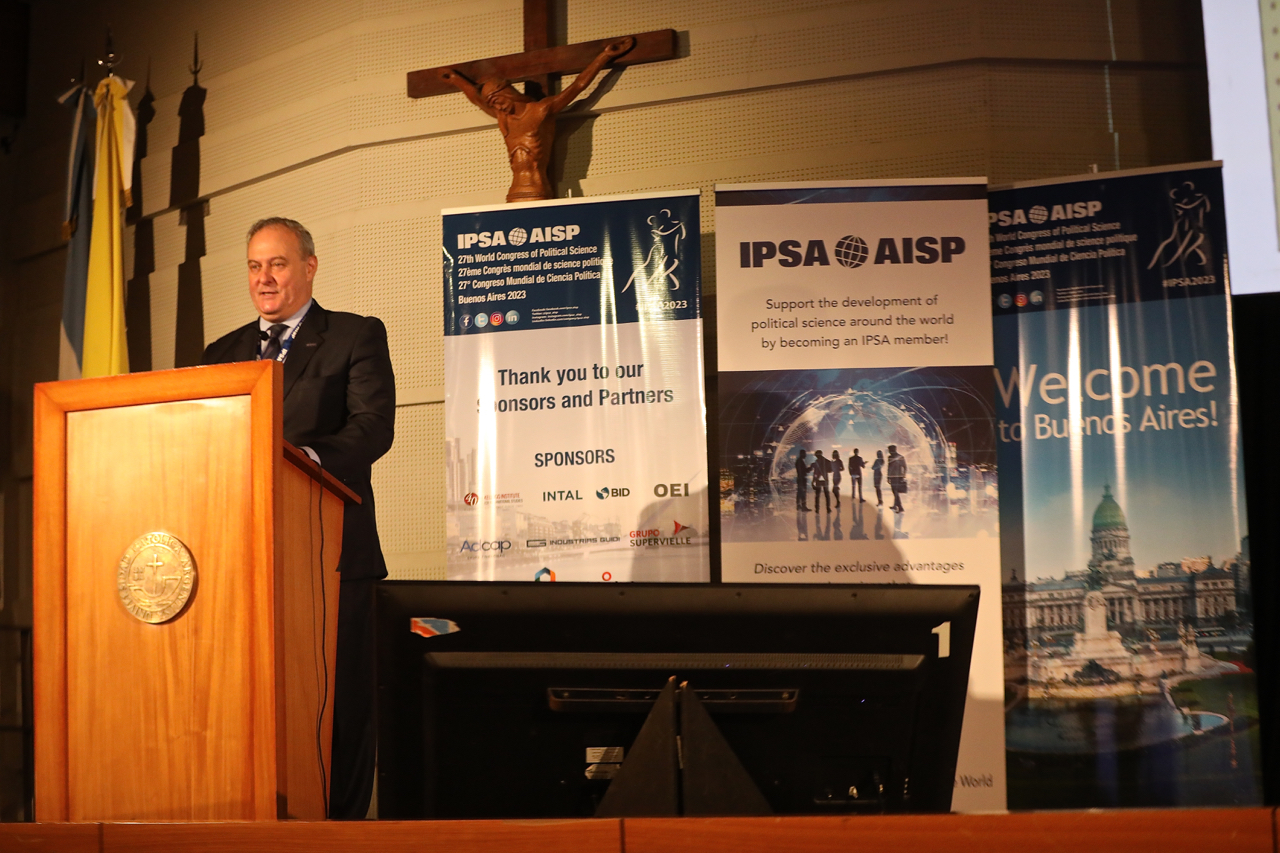 Presiden Pablo Oñate especially thanked the two Co-Chairs of the Local Organizing Committee, Martín D'Alessandro and María Laura Perera Taricco, for their extraordinary efforts in making the Congress a resounding success. President Oñate enthusiastically proclaimed that the 2023 IPSA World Congress stands out as one of the best in the history of the Association. He also expressed his appreciation to the World Congress Program Co-Chairs, Euiyoung Kim and Theresa Reidy, for their invaluable contributions and excellent work in shaping the Congress program.
Presiden Pablo Oñate especially thanked the two Co-Chairs of the Local Organizing Committee, Martín D'Alessandro and María Laura Perera Taricco, for their extraordinary efforts in making the Congress a resounding success. President Oñate enthusiastically proclaimed that the 2023 IPSA World Congress stands out as one of the best in the history of the Association. He also expressed his appreciation to the World Congress Program Co-Chairs, Euiyoung Kim and Theresa Reidy, for their invaluable contributions and excellent work in shaping the Congress program.
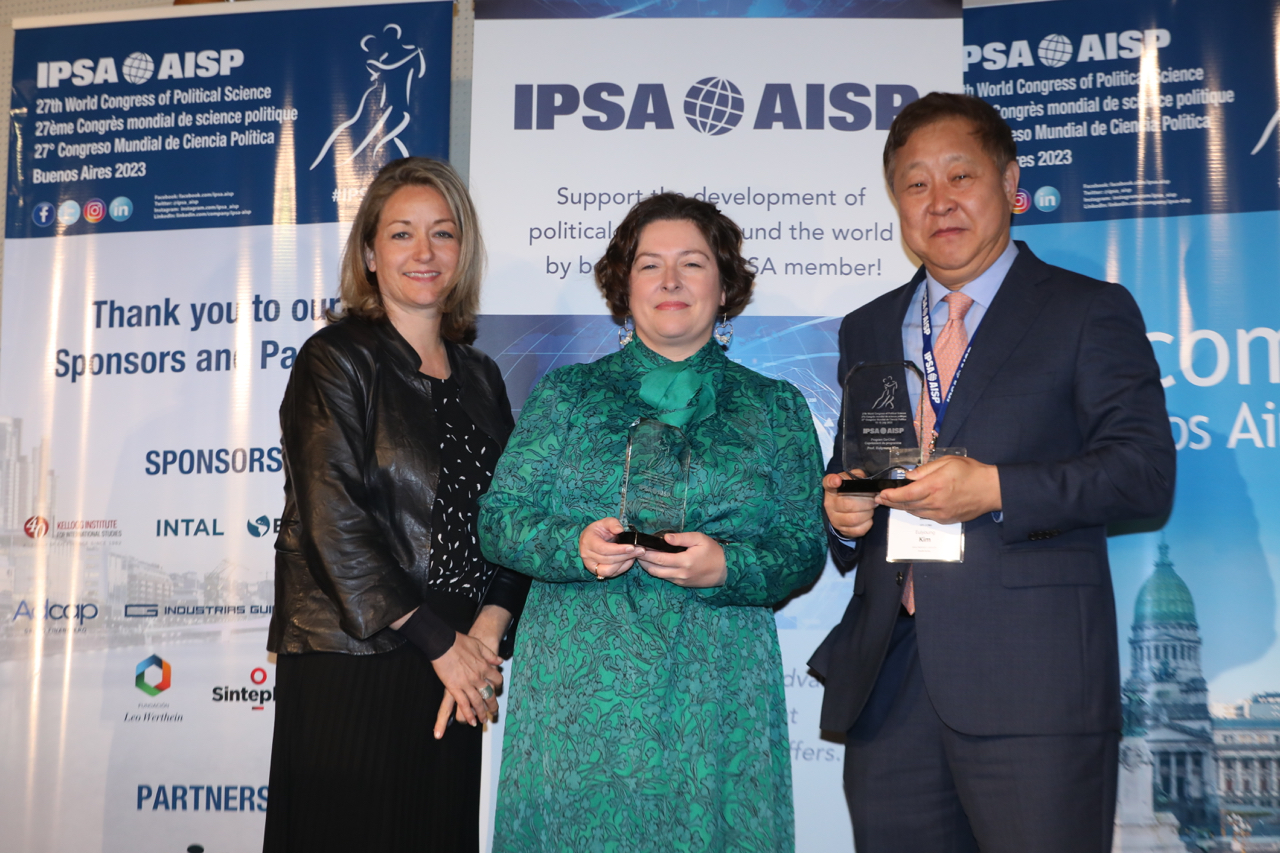 Next, IPSA World Congress Program Co-Chairs Theresa Reidy and Euiyoung Kim took the stage. Dr. Reidy expressed her pleasure in creating the program for the 2023 World Congress and spoke about the complexity of creating a hybrid program. She thanked the IPSA World Congress team, the IPSA Secretariat, the Program Committee, the Executive Committee and the General Session Chairs for their hard work and support. Most of all, she thanked the delegates for their enthusiasm and inspiration throughout the Congress.
Next, IPSA World Congress Program Co-Chairs Theresa Reidy and Euiyoung Kim took the stage. Dr. Reidy expressed her pleasure in creating the program for the 2023 World Congress and spoke about the complexity of creating a hybrid program. She thanked the IPSA World Congress team, the IPSA Secretariat, the Program Committee, the Executive Committee and the General Session Chairs for their hard work and support. Most of all, she thanked the delegates for their enthusiasm and inspiration throughout the Congress.
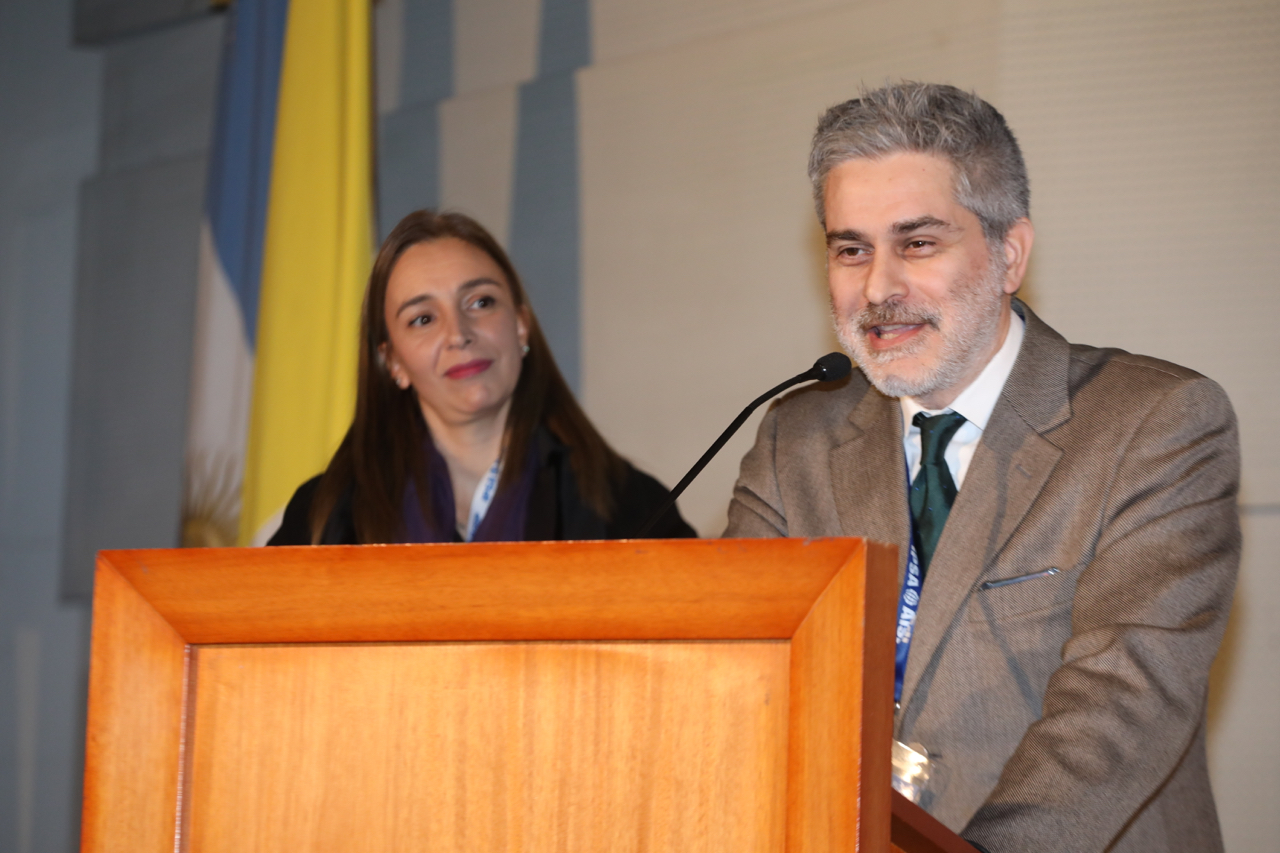 The Co-chairs of the Local Organizing Committee María Laura Perera Taricco and Martín D'Alessandro expressed how honoured and privileged they felt to host the 2023 IPSA World Congress in Buenos Aires. They thanked IPSA for entrusting them with this responsibility and acknowledged the hard work of their LOC team and volunteers.
The Co-chairs of the Local Organizing Committee María Laura Perera Taricco and Martín D'Alessandro expressed how honoured and privileged they felt to host the 2023 IPSA World Congress in Buenos Aires. They thanked IPSA for entrusting them with this responsibility and acknowledged the hard work of their LOC team and volunteers.
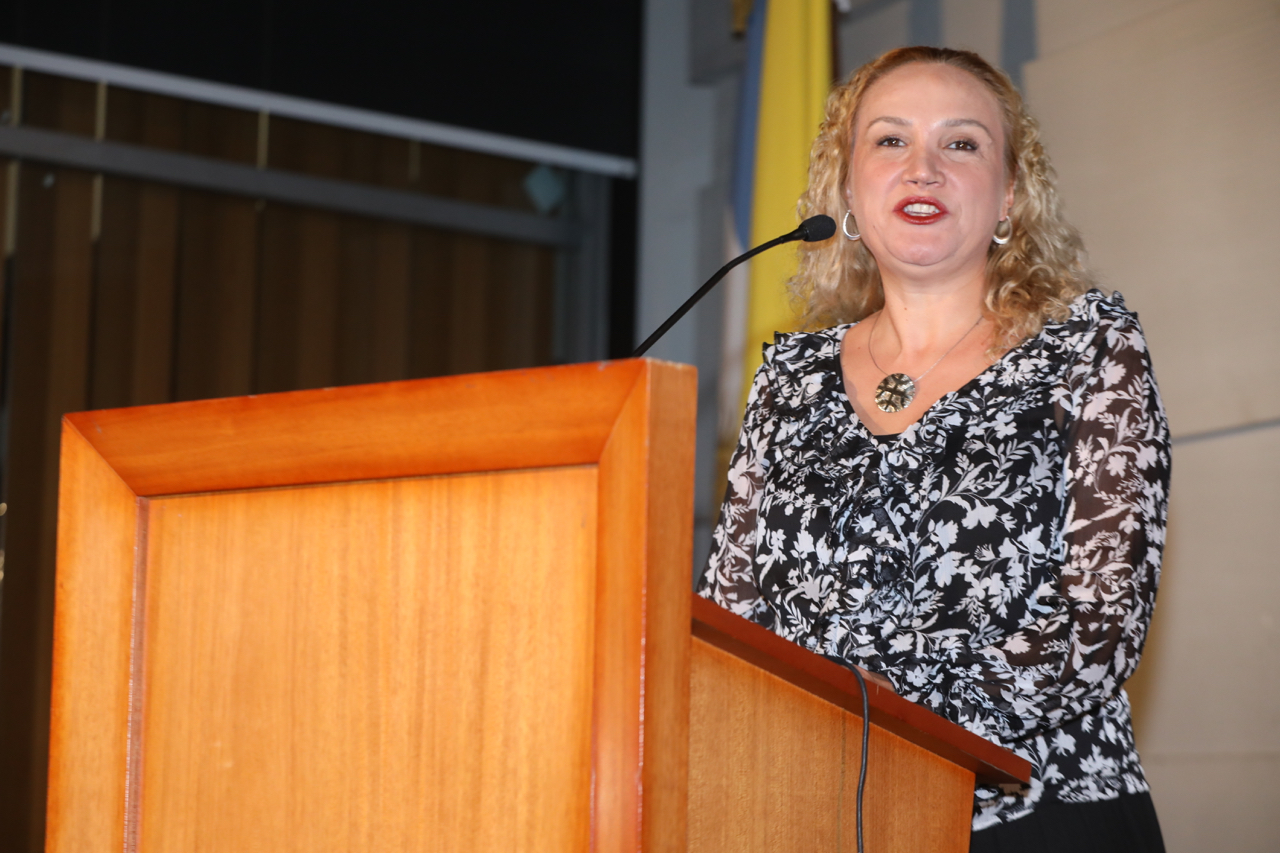
The next speaker was Hasret Dikici Bilgin, the Chair of the IPSA Committee on Organization, Procedures and Awards (COPA), to present the following IPSA awards:
- The Francesco Kjellberg Award for Outstanding Papers Presented by New Scholars went to Leonard Hamza for his paper "Local Government Accountability, Oversight, and the Intervention Mechanism in South Africa";
- APSA-IPSA Theodore J. Lowi First Book Award went to Fiona Feiang Shen-Bayh for her first book, "Undue Process: Persecution and Punishment in Autocratic Courts", published by Cambridge University Press in 2022;
- The Wilma Rule Award on Gender and Politics went to Mariana Gené and Carolina Glasserman for their paper "Informal Rules and Gendered Political Hierarchies: On the Experience of Women Deputies in the Argentine Congress";
- Finally, the Stein Rokkan Travel Grant Award went to Alexandros-Christos Gkotinakos.
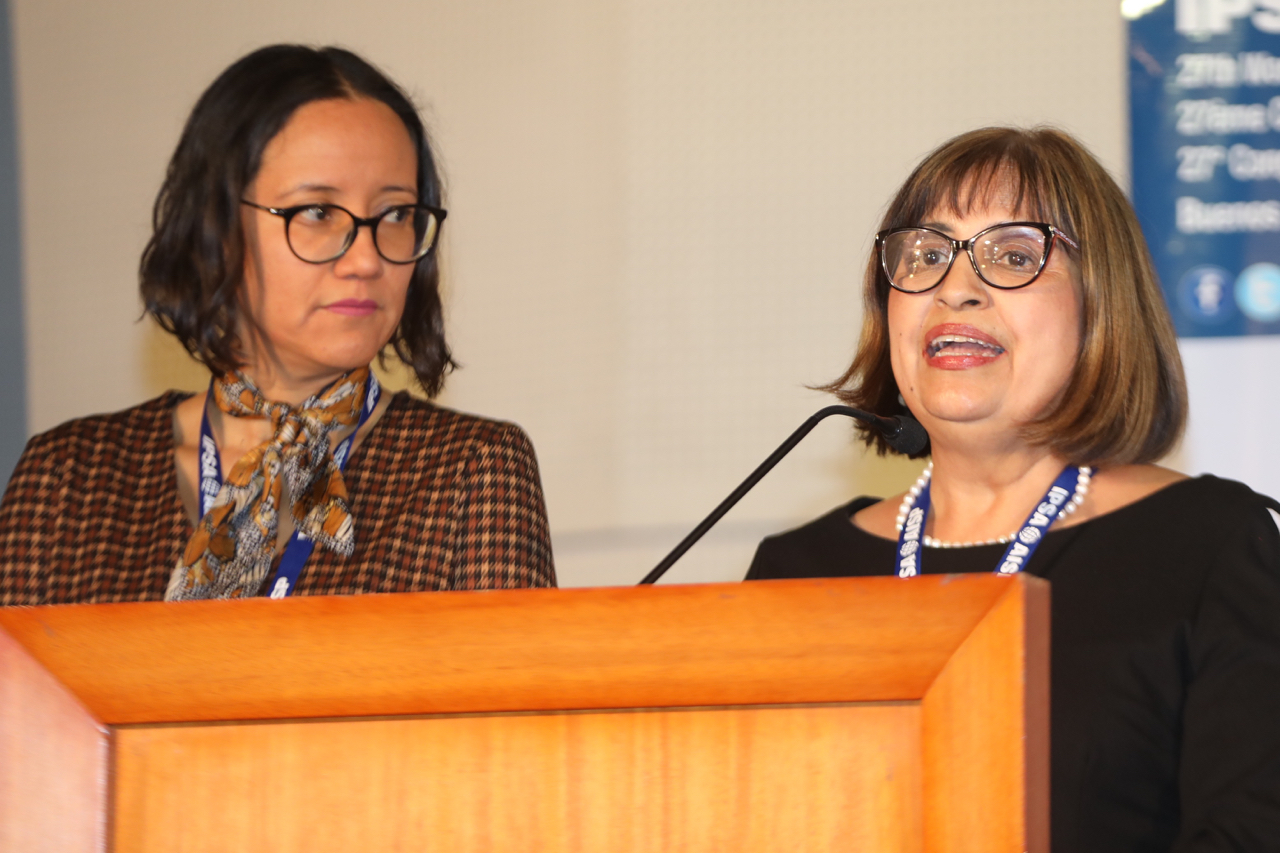 The Co-chairs and the theme of the 2025 IPSA World Congress in Seoul, South Korea, were also announced at the Closing Ceremony. The 2025 Program Co-chairs, Irasema Coronado and Azul A. Aguiar-Aguilar, thanked all attendees for their active involvement in the conference. They highlighted the Congress' contribution to developing theories, disseminating empirical research, and strengthening academic networks. The 2025 Congress theme will be “Resisting Autocratization in Polarized Societies”. The Co-chairs encouraged IPSA delegates, especially undergraduate and graduate students to present their research at the next Congress.
The Co-chairs and the theme of the 2025 IPSA World Congress in Seoul, South Korea, were also announced at the Closing Ceremony. The 2025 Program Co-chairs, Irasema Coronado and Azul A. Aguiar-Aguilar, thanked all attendees for their active involvement in the conference. They highlighted the Congress' contribution to developing theories, disseminating empirical research, and strengthening academic networks. The 2025 Congress theme will be “Resisting Autocratization in Polarized Societies”. The Co-chairs encouraged IPSA delegates, especially undergraduate and graduate students to present their research at the next Congress.
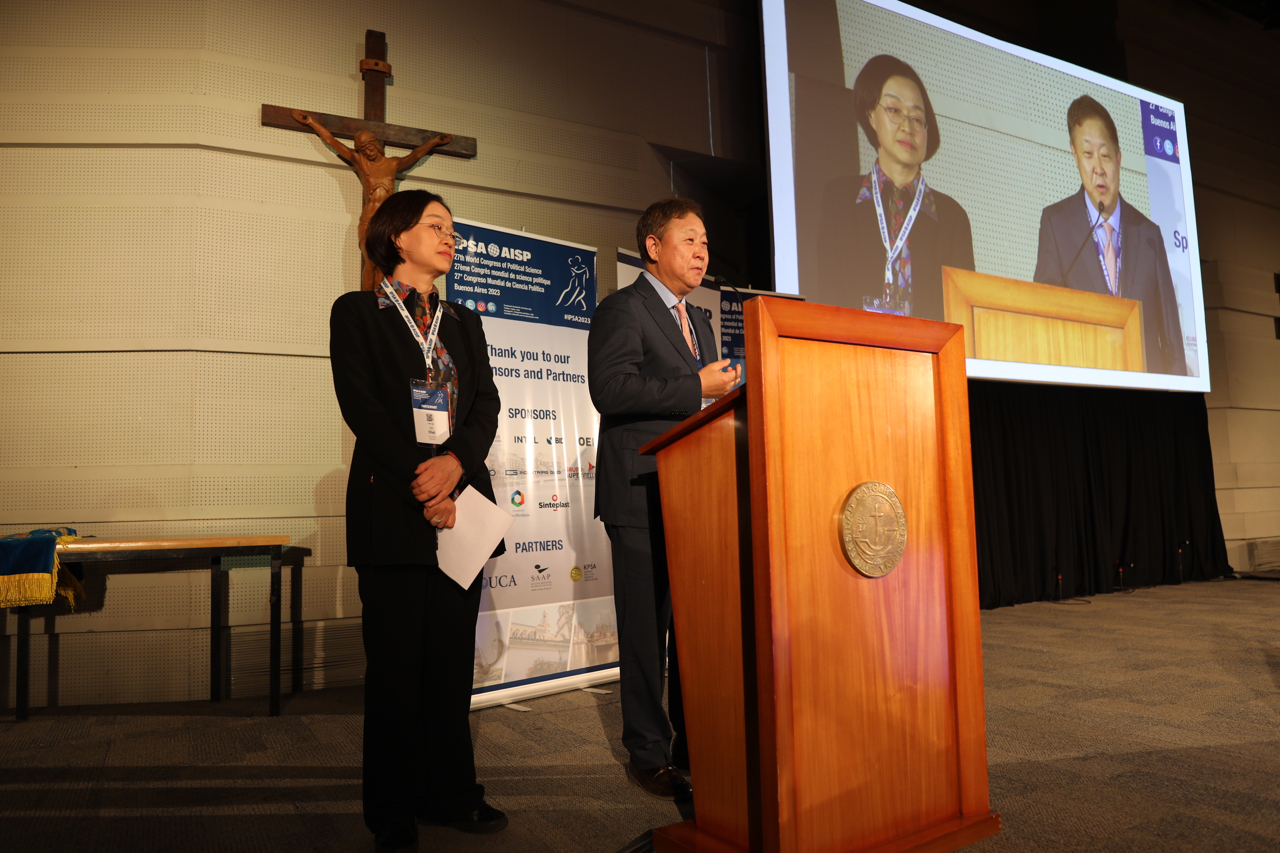 Euiyoung Kim and Ajin Choi, the Co-Chairs of the 2025 IPSA World Congress Local Organizing Committee (LOC), stated their objectives and their vision for hosting the next World Congress. The new LOC has already been formed, consisting of five co-chairs, a group of honorary chairs and a board of advisors. Inspired by the cooperation of different Latin American associations in the 2023 Local Organizing Committee, the 2025 LOC will also collaborate with other associations in the region, including Japan and Taiwan. A step further, scholars from the Global South will also be invited as special advising members of the LOC.
Euiyoung Kim and Ajin Choi, the Co-Chairs of the 2025 IPSA World Congress Local Organizing Committee (LOC), stated their objectives and their vision for hosting the next World Congress. The new LOC has already been formed, consisting of five co-chairs, a group of honorary chairs and a board of advisors. Inspired by the cooperation of different Latin American associations in the 2023 Local Organizing Committee, the 2025 LOC will also collaborate with other associations in the region, including Japan and Taiwan. A step further, scholars from the Global South will also be invited as special advising members of the LOC.
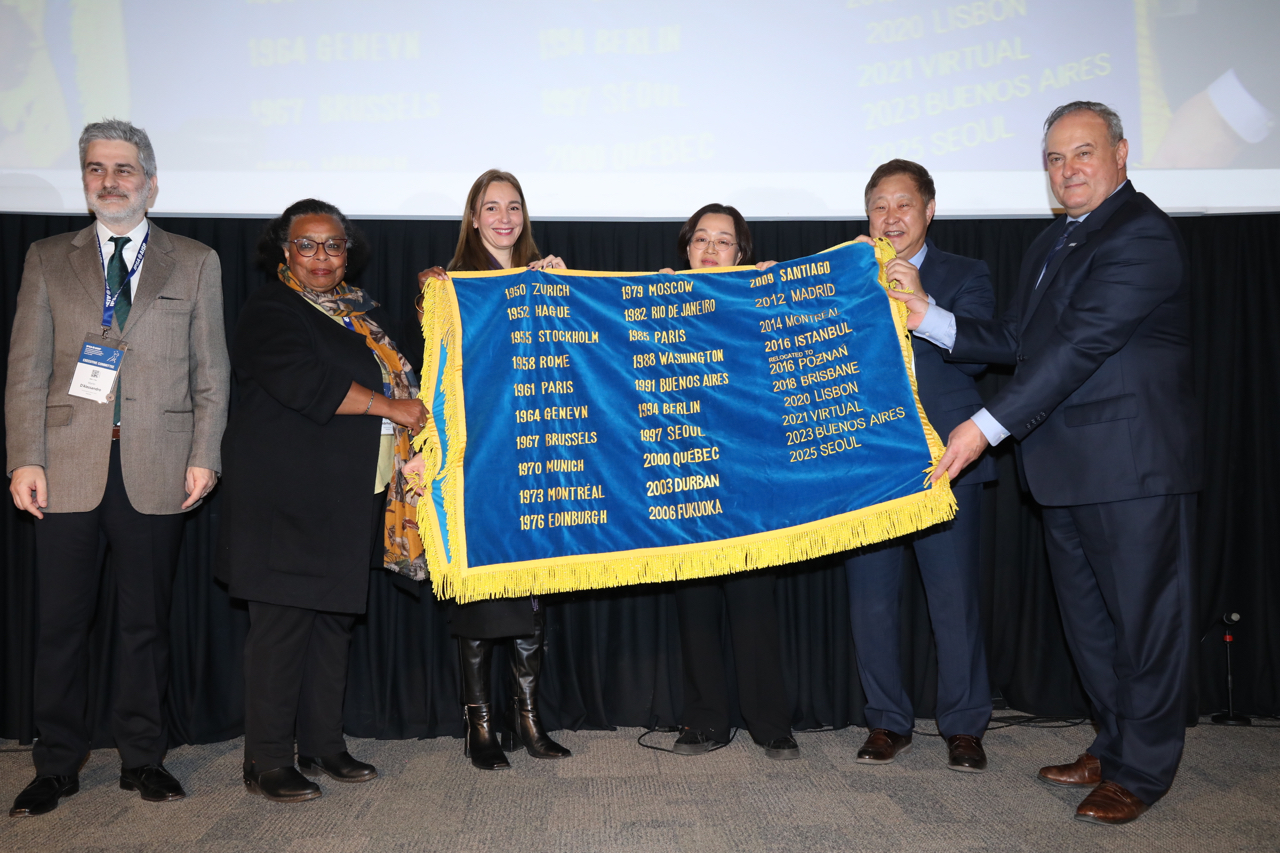 The 2025 LOC address was followed by the ceremonial passing of the IPSA Congress Flag, symbolizing the transfer of duties and responsibilities from the current LOC, represented by the LOC Co-Chairs Martín D'Alessandro and María Laura Perera Taricco, to the next one, represented by the Korean LOC Co-Chairs Euiyoung Kim and Ajin Choi with the participation of IPSA Past President Dianne Pinderhughes and IPSA President Pablo Oñate.
The 2025 LOC address was followed by the ceremonial passing of the IPSA Congress Flag, symbolizing the transfer of duties and responsibilities from the current LOC, represented by the LOC Co-Chairs Martín D'Alessandro and María Laura Perera Taricco, to the next one, represented by the Korean LOC Co-Chairs Euiyoung Kim and Ajin Choi with the participation of IPSA Past President Dianne Pinderhughes and IPSA President Pablo Oñate.
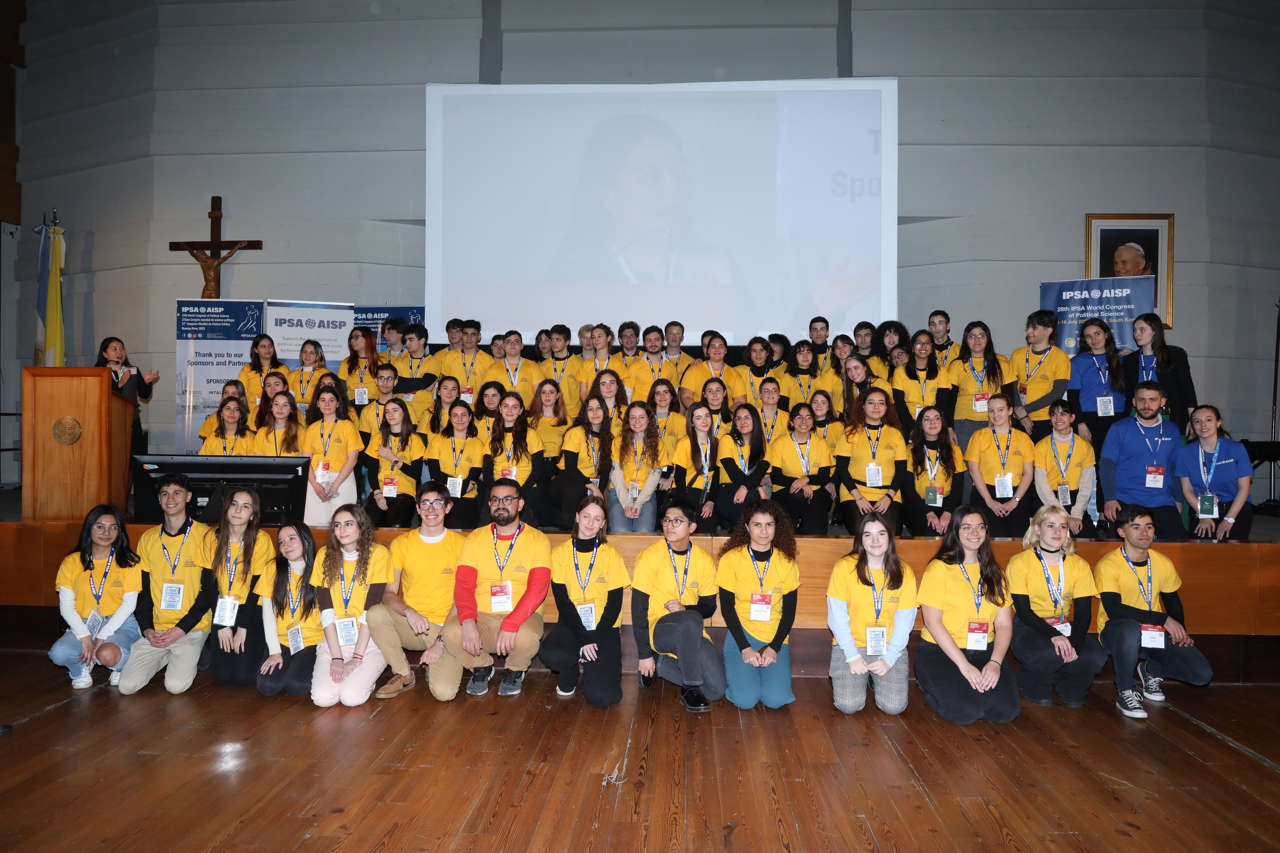
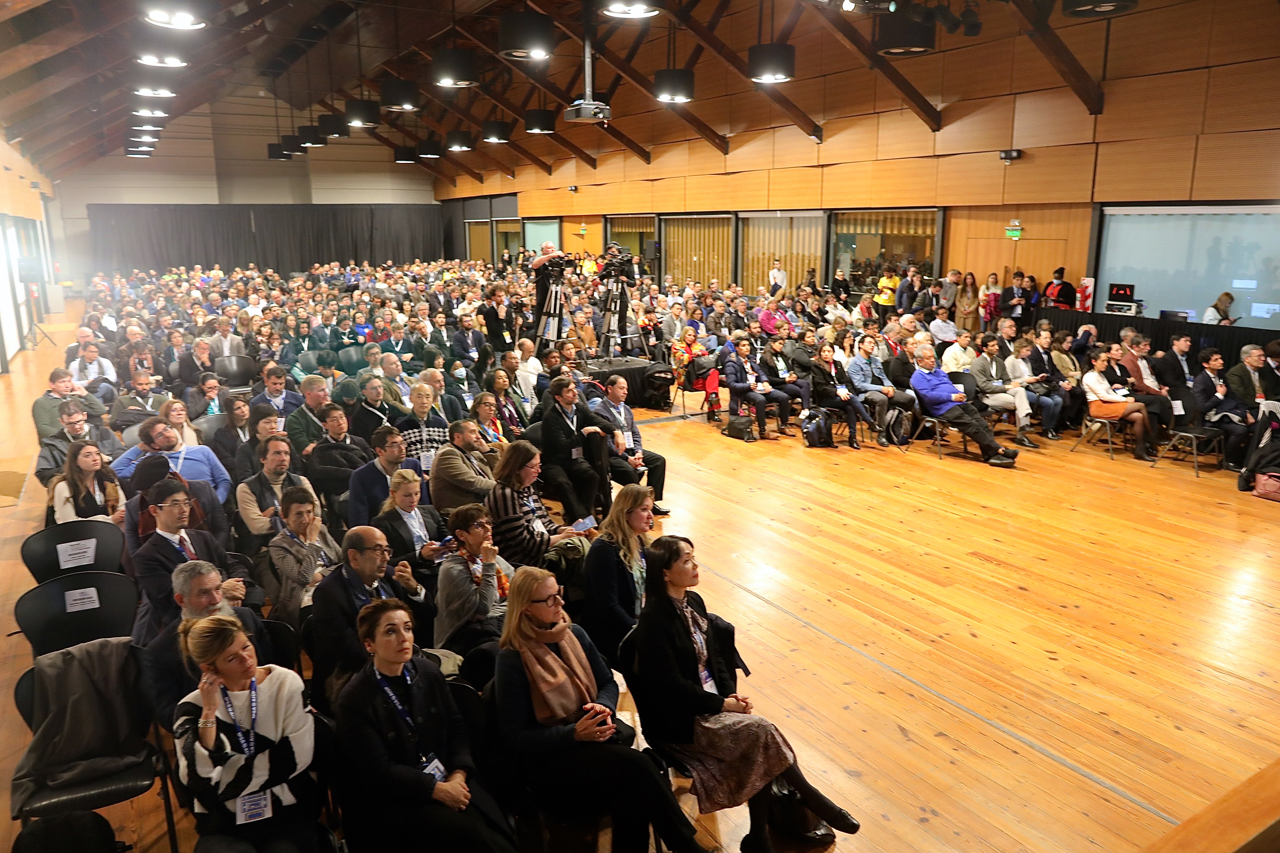
The Closing Ceremony concluded with two spectacular musical performances that showcased the diversity and richness of both the Argentinian and Korean cultures. The first performance, a cross-cultural Tango featuring the collaboration of Korean and Argentinian dancers and musicians, fascinated the audience.
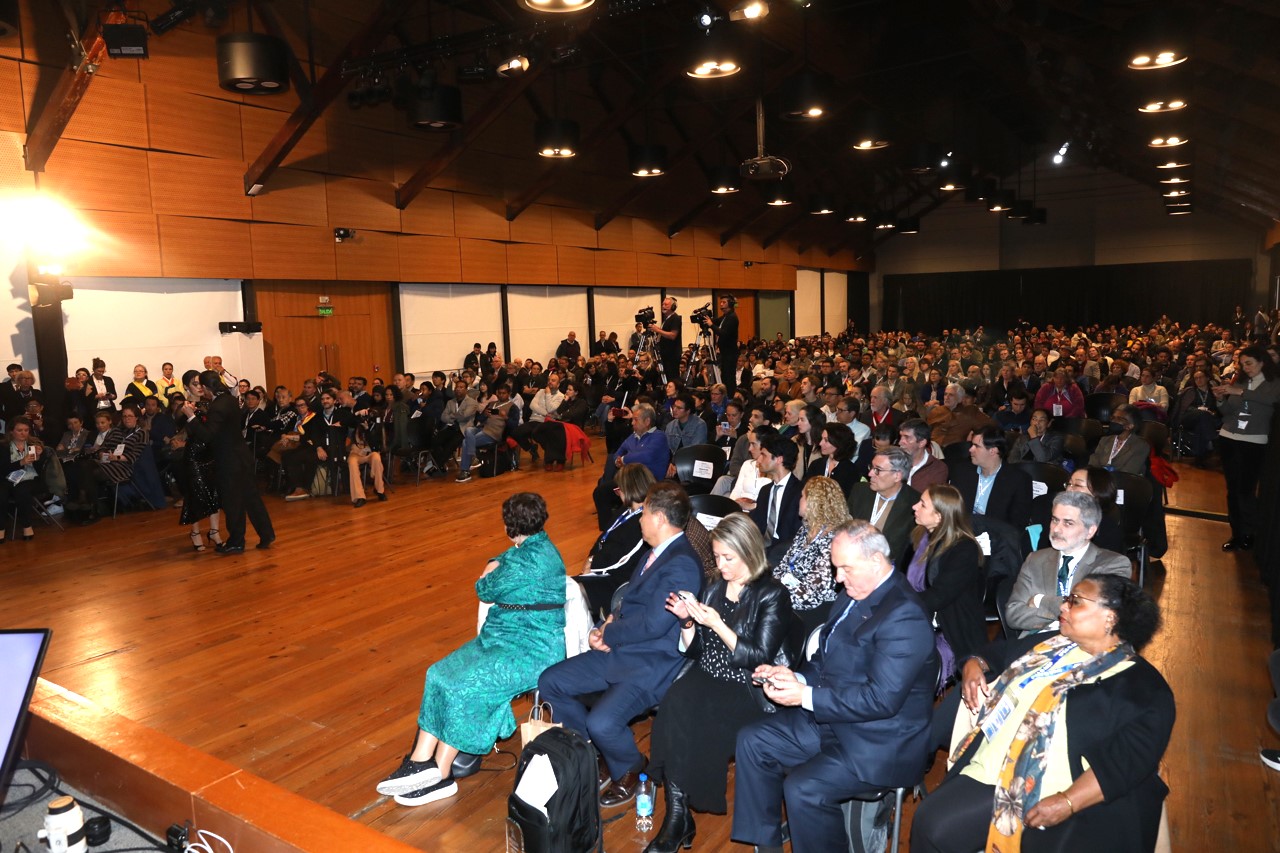
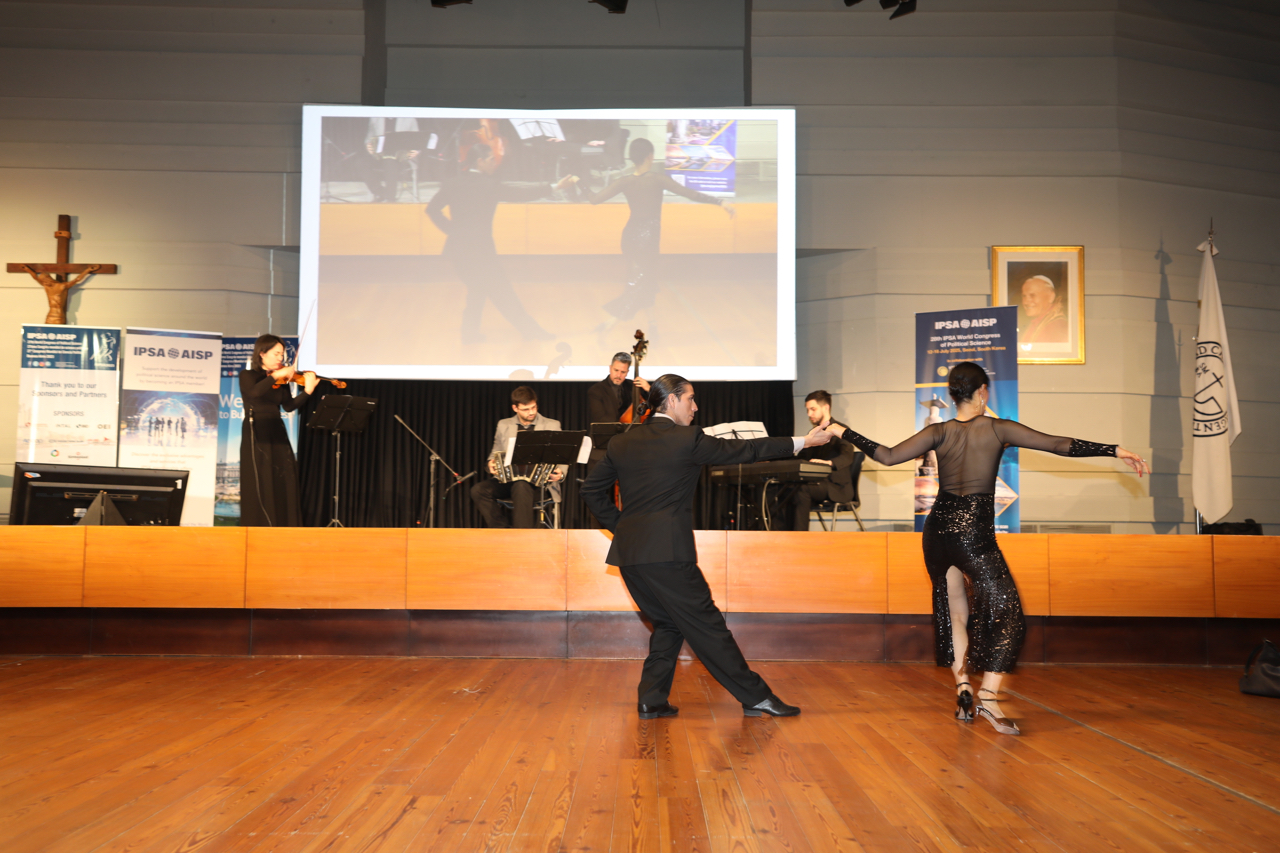
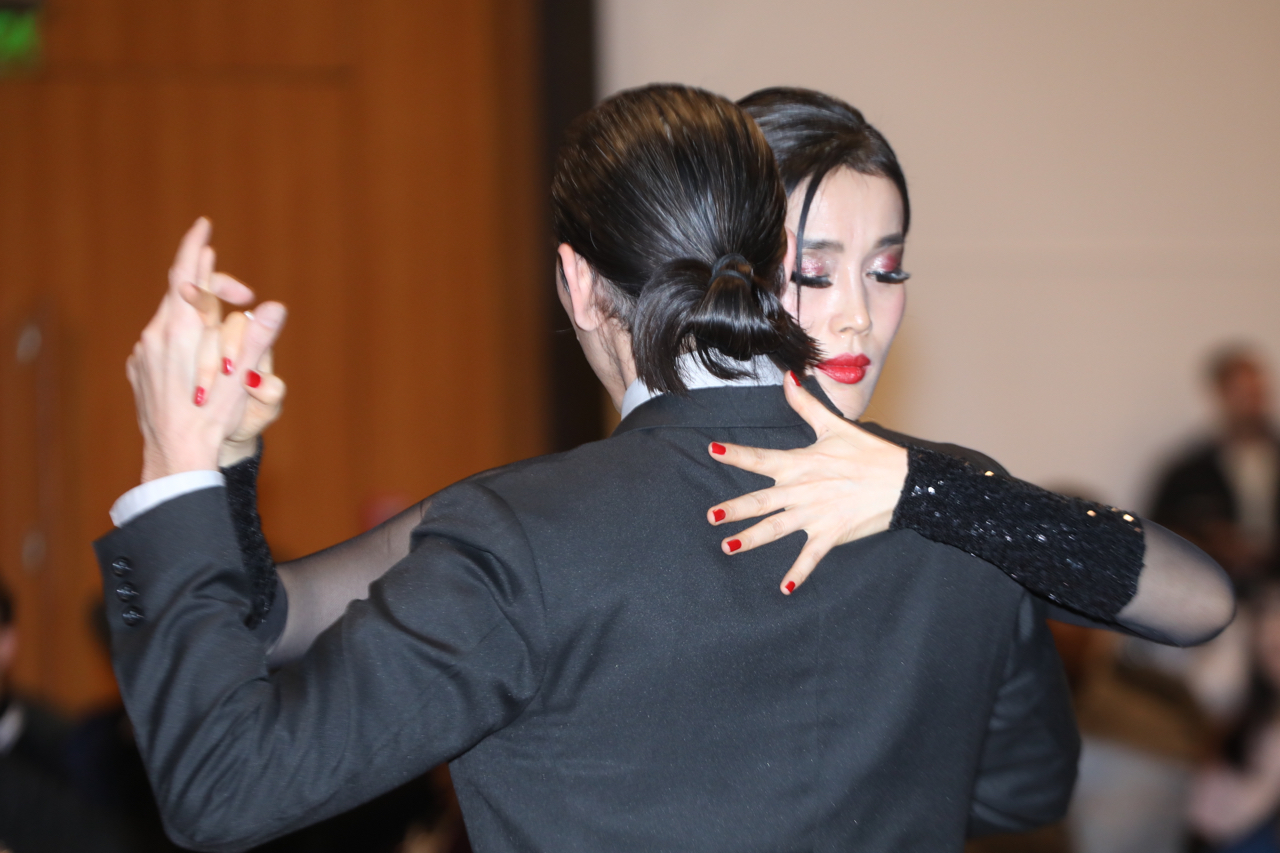
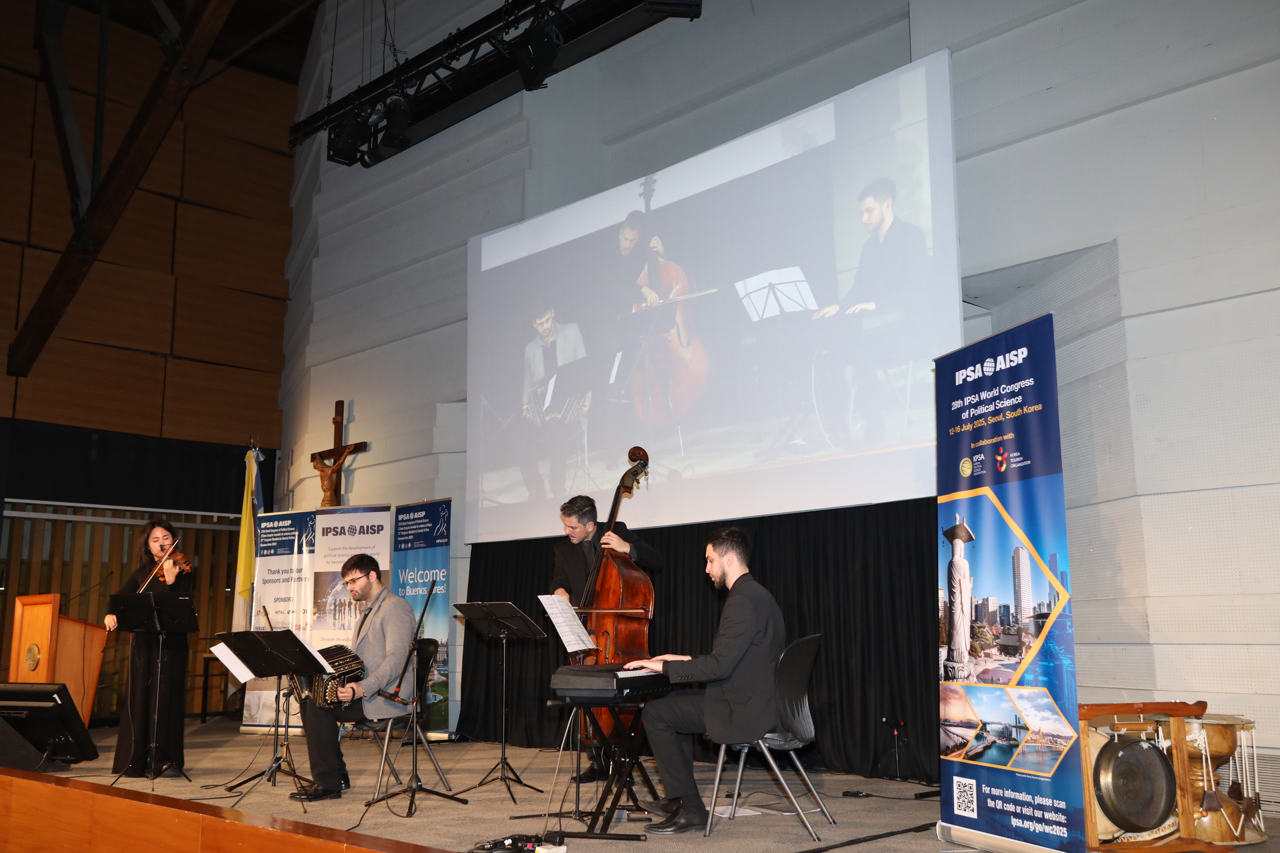
The second was a traditional Korean dance called Samul nori which was arranged by the Embassy of South Korea in Buenos Aires. The musicians played four different instruments, including two different gongs and two drums. They created a lively and energetic sound that accompanied the dancers, who wore colourful costumes. The music performances were followed by a cocktail reception in the exhibition area.
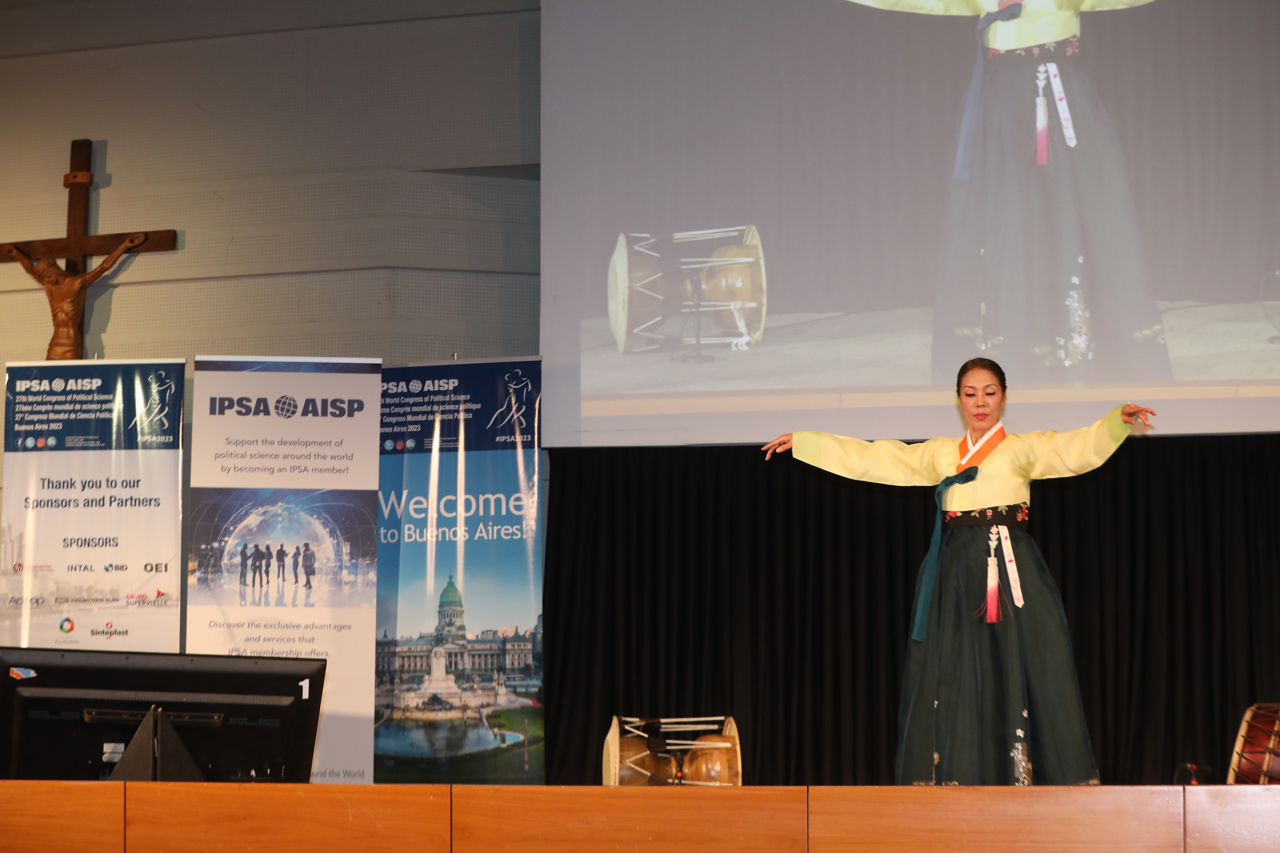
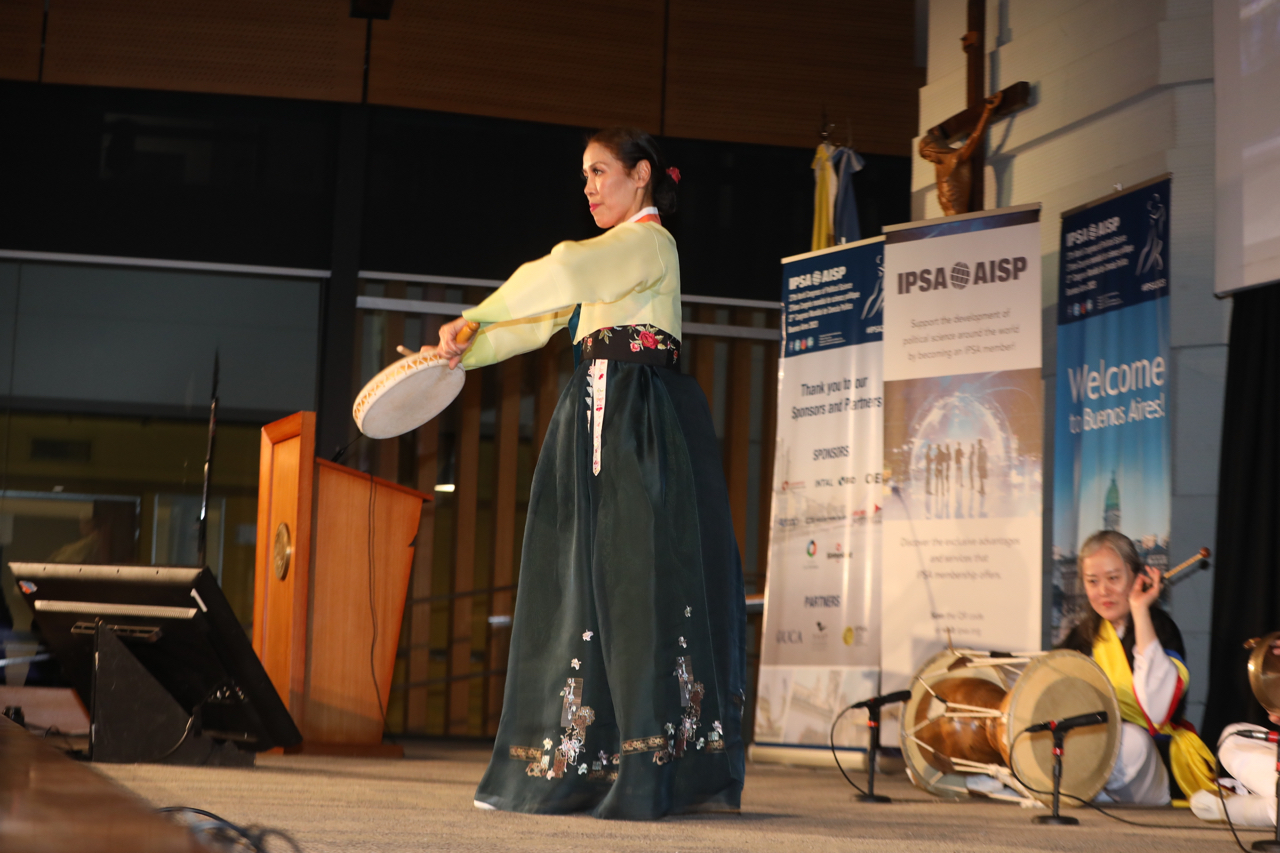
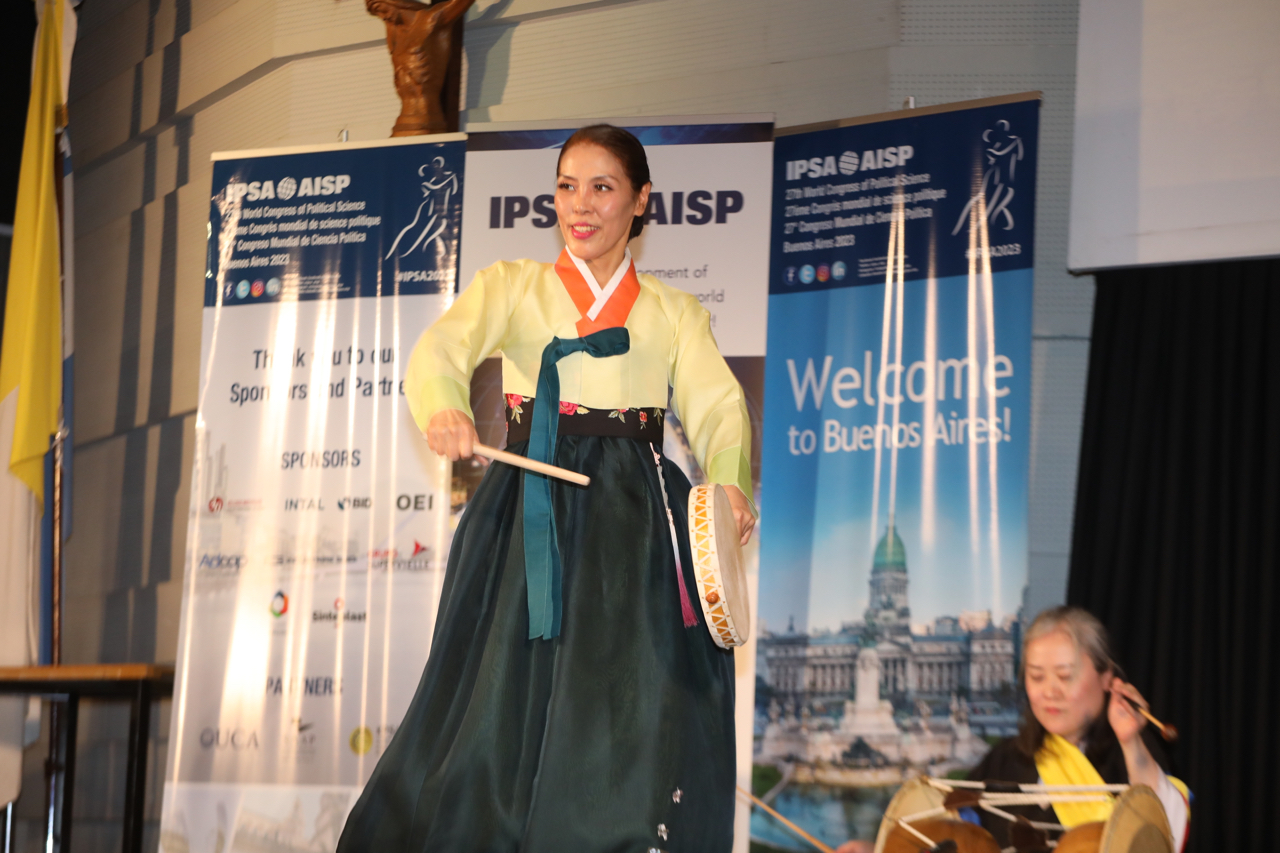
You can watch the Closing Ceremony here:











